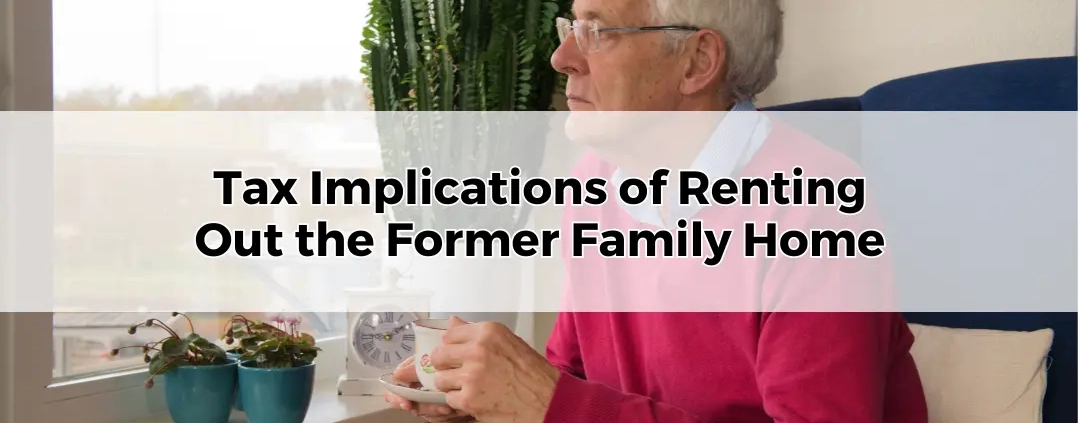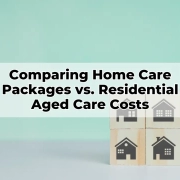Tax Implications of Renting Out the Former Family Home
Table of Contents
ToggleAged care in Australia involves a complex interplay of services, financial considerations, and personal decisions. As the population ages, the demand for quality aged care continues to rise, necessitating careful financial planning to ensure adequate support and comfort for the elderly.
Effective financial planning is paramount when transitioning into aged care. It involves evaluating assets, potential income sources, and understanding the tax implications of various decisions. Renting out the former family home is a common strategy used to generate income to cover aged care expenses.
Renting out the former family home can provide a steady stream of income, helping to offset the costs associated with aged care. However, this decision comes with significant tax implications that must be carefully considered.
Understanding the Basics
Definition of Rental Income
Rental income refers to the payments received from tenants for the use of your property. This income is considered taxable by the Australian Taxation Office (ATO) and must be reported annually.
Taxable Income Overview
Taxable income includes all income earned during the financial year, minus any allowable deductions. For rental properties, this means reporting the gross rental income and subtracting eligible expenses to determine the net taxable amount.
Legal Requirements for Landlords
Landlords in Australia must adhere to various legal requirements, including providing a safe and habitable property, maintaining the property, and complying with tenancy laws. Understanding these obligations is crucial for avoiding legal complications.
Income Tax Implications
Rental Income as Taxable Income
All rental income must be declared on your tax return. This includes rent received, bond money retained, and any associated payments like insurance payouts or reimbursements for repairs.
Reporting Rental Income to the ATO
Landlords must report rental income on their annual tax returns. Accurate records of all income and expenses are essential for compliance and to ensure all allowable deductions are claimed.
Allowable Deductions
Landlords can claim various deductions against rental income, including property management fees, maintenance costs, interest on loans, and depreciation. These deductions help reduce the overall taxable income.
Capital Gains Tax (CGT)
Definition and Relevance of CGT
Capital Gains Tax is a tax on the profit made from the sale of an asset. It is applicable when you sell the rental property, with the gain being the difference between the selling price and the purchase price, adjusted for certain costs.
Primary Residence Exemption
The primary residence exemption allows homeowners to exclude their main residence from CGT. However, once the property is rented out, this exemption may no longer apply, or only a partial exemption may be available.
Impact of Renting on CGT
Renting out the former family home impacts CGT liability. If the property was your main residence before renting, you might be eligible for a partial exemption, depending on the duration it was rented.
Deductions and Depreciation
What Can Be Deducted?
Deductions include property management fees, repairs, interest on loans, insurance, and council rates. Claiming these expenses can significantly reduce your taxable rental income.
Depreciation of Assets
Depreciation allows landlords to deduct the decline in value of the property’s fixtures and fittings over time. This includes items like carpets, appliances, and furniture.
Capital Works Deductions
Capital works deductions refer to the building’s structural improvements. These deductions are spread over several years, offering a long-term tax benefit.
Negative Gearing
Explanation of Negative Gearing
Negative gearing occurs when the costs of owning a rental property exceed the income it generates. This loss can be offset against other income, reducing overall taxable income.
Benefits and Risks
While negative gearing can offer tax advantages, it carries risks. The strategy relies on capital growth and rental income stability, making it essential to consider market conditions and financial resilience.
Long-term Financial Considerations
Negative gearing can be a viable long-term strategy if property values increase and rental income grows. However, it requires careful financial planning and risk management.
Impact on Pension and Benefits
Means Testing for Aged Pension
Rental income affects means testing for the aged pension. The income and asset tests determine eligibility and the amount of pension received, making it crucial to understand how rental income impacts these assessments.
Rental Income and Pension Reduction
Receiving rental income can reduce pension entitlements. The income test considers rental income, potentially lowering the pension amount received.
Strategies to Minimise Impact
Strategies to minimise the impact on pension entitlements include utilising allowable deductions to reduce taxable rental income and seeking professional financial advice to optimise overall financial outcomes.
State and Local Taxes
Land Tax Considerations
Land tax is a state-based tax on the value of land owned. Renting out property may subject it to land tax, depending on the state’s regulations and thresholds.
Council Rates and Charges
Council rates are local government charges for property services. These rates continue to apply to rental properties and must be factored into the financial planning of rental income.
Rental Property Compliance
Ensuring compliance with state and local regulations is essential. This includes adhering to tenancy laws, safety standards, and property maintenance requirements.
GST Implications
When GST Applies
GST generally does not apply to residential rental income. However, if the property is used for business purposes or is part of a commercial rental arrangement, GST may be applicable.
GST on Rental Income
Residential rental income is typically GST-exempt. Understanding the specific GST implications for your rental arrangement is crucial for accurate tax reporting.
GST on Property Sales
GST may apply when selling a property, particularly if it’s new or used for commercial purposes. Knowing these rules helps avoid unexpected tax liabilities.
Financial Planning and Advice
Importance of Professional Advice
Professional financial advice is vital when renting out property to fund aged care. Experts can provide tailored strategies to optimise tax outcomes and ensure financial stability.
Selecting the Right Financial Adviser
Choosing a qualified and experienced financial adviser is critical. Look for advisers with expertise in aged care planning and rental property management.
Key Questions to Ask
Key questions include the adviser’s experience with rental properties, fee structures, and strategies for maximising tax benefits and minimising liabilities.
Legal and Compliance Issues
Rental Agreements and Tenancy Laws
Understanding rental agreements and tenancy laws ensures compliance and protects landlord rights. These laws govern the landlord-tenant relationship, covering rent, maintenance, and dispute resolution.
Landlord Responsibilities
Landlords must fulfill responsibilities, including property maintenance, safety standards, and legal compliance. Failure to do so can result in penalties and tenant disputes.
Ensuring Compliance with Regulations
Staying updated on legal and regulatory changes is essential. Regular reviews and professional advice help ensure ongoing compliance and avoid legal issues.
Conclusion
Summary of Key Tax Implications
Renting out the former family home to fund aged care involves significant tax implications, including income tax, CGT, and state taxes. Understanding these impacts is crucial for effective financial planning.
Final Thoughts on Renting Out the Former Family Home
Renting out the former family home can provide valuable income for aged care expenses. However, it requires careful consideration of tax implications and financial planning.
Encouragement for Informed Decision-Making
Making informed decisions involves understanding all financial and tax implications, seeking professional advice, and strategically planning to optimise outcomes for aged care funding.









